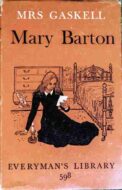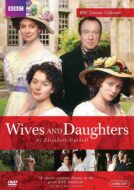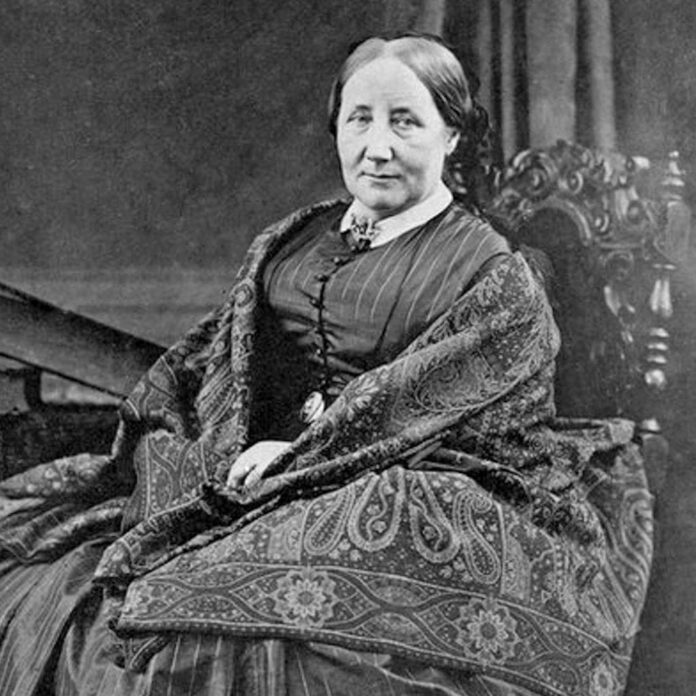Just who is that starchy-looking matron with the house on Plymouth Grove and the occasional TV series? Why didn’t we read her at school? Has she been dredged up from some Victorian time capsule for the benefit of the Manchester heritage trail or would it be worth our while taking Christmas off one year to read the pumping powerhouses that are North and South, Cranford and Wives and Daughters?
Received wisdom says that Mary Barton – the story of a mill hand whose life goes awry after taking a stand against working conditions – and North and South – a romance set against the backdrop of industrial Manchester – are the work of a writer instrumental in taking hold of the novel form and wrenching out of the parsonage into the factory. “Oh Mrs Gaskell! Fearful! fearful! If I were Mr G oh heavens how I would beat her!”
So said Charles Dickens – and he was a fan.
What’s to do then? We tracked down Libby Tempest, ace librarian and chair of the Gaskell Society, in search of some perspective…

Why do you love Elizabeth Gaskell?
For her warmth, her humour, her empathy, her understanding of human nature and relationships: for the way she campaigned for women and for the working-class. For her ability to tell a really good story and the sheer quality of her writing. For her bravery in tackling subjects that were continually ‘swept under the carpet’ by fellow authors.
Why do people refer to her as ‘Mrs Gaskell’ and is it still okay to do so?
She was the wife of William Gaskell, minister of the Unitarian Chapel at Cross Street. But in Victorian times, married women (even famous writers!) would always be seen, first and foremost, as a wife. Today maybe we should call her Elizabeth Gaskell…but I still often find myself referring to her affectionately as Mrs G.
Is she ‘second tier’ when it comes to Victorian literature?
The answer to this question refers directly back to the previous one. In Victorian times, married women authors seem to have been taken less seriously than their single sisters – for example, Jane Austen, Charlotte Bronte, George Eliot. My Russell Group university English degree course did not even mention Elizabeth Gaskell! The first time I read her, I could hardly believe what I was reading – where had she been all my life??
Is her first novel Mary Barton (the one most directly associated with Manchester) not sometimes referred to as ‘a practice attempt’?
I have never heard this description! It was written partly in response to the death of her baby son in 1845. As my friend the writer and academic Sherry Ashworth puts it “she was writing  herself back to life”. But this was a groundbreaking novel as well as a first novel; I defy anyone to read Chapter 6 Poverty and Death, in which Mary’s father John and his friend Wilson encounter the Davenport family, and not be affected. It is now acknowledged to be one of the very first English novels to truthfully confront the effects of social injustice between the classes.
herself back to life”. But this was a groundbreaking novel as well as a first novel; I defy anyone to read Chapter 6 Poverty and Death, in which Mary’s father John and his friend Wilson encounter the Davenport family, and not be affected. It is now acknowledged to be one of the very first English novels to truthfully confront the effects of social injustice between the classes.
Is North and South basically a Mancunian Pride and Prejudice?
North & South is indeed a great love story but it is also a novel highlighting the need for social change and reform. And Elizabeth Gaskell was brilliant at both – her description of John Thornton’s passionate love for Margaret Hale and his despair at her rejection of him is so powerful – this is a writer who understood sexual love and passion.
Is it not the case that as the wife of a clegyman her pleas for understanding of the poor refer largely to the misguidedness of their actions?
The opposite is true. As the wife of a clergyman, Elizabeth saw Manchester working-class life in all its reality: for example the Davenport story, referred to in point 4 was based on a real-life case told to William by a visitor for the Domestic Home Mission, while he was on the committee enquiring into the state of the poor in the 1840s. Her job as she saw it, was to write about working-class life honestly, to make her readers aware, as the first steps towards change.
Is Cranford the good / popular one?
Cranford is perhaps still the best-known and best-loved of Elizabeth Gaskell’s works and this was helped enormously by Judi Dench appearing in the popular BBC adaptation. But how Cranford is regarded as a literary work has changed and evolved in recent years – is it the story of a collection of twittery middle-class old ladies or is it a work of quiet feminist revolution?
Which is your favourite?
I do genuinely love them all, but my favourite is her last novel Wives & Daughters, though I must prepare you for the fact that sadly it was unfinished at her death in 1865. I did not know this when I first read it and got to page 648 before I realised, by which point I was nearly tearing my hair out! Having said this, it is pretty clear where she was going with her  plot and characters.
plot and characters.
Is her Life of Charlotte Bronte any good given she left out all the juicy stuff?
The biography of her friend Charlotte Bronte could be described as a labour of love and her partial objective was to rescue her friend’s reputation from allegations of ‘coarseness’ that her family and friends had found so distressing. Elizabeth WAS protective of her friend but it has to be remembered that most of the people named in the book were still alive – and there must have been some ‘juicy bits’ in the first edition because she was threatened with two libel suits.
What is your favourite story about her?
This is taken from a letter Elizabeth wrote to her friend Charles Eliot Norton, dated October 1859. It concerns the Pre-Raphaelite painter Dante Gabriel Rossetti, famous for the glossy-haired women in his paintings: “I think we got to know Rossetti pretty well. I met him at two evening parties, where I had a good deal of talk with him, always excepting the times when ladies with beautiful hair came in. It did not signify what we were talking about or how agreeable I was; if a particular kind of reddish-brown, wavy hair came in, he was away in a moment, struggling for an introduction to the owner of said head of hair. He is not as mad as a March hare, but hair-mad.” Love it – and love her.
For more on Elizabeth Gaskell visit gaskellsociety.co.uk and elizabethgaskellhouse.co.uk







